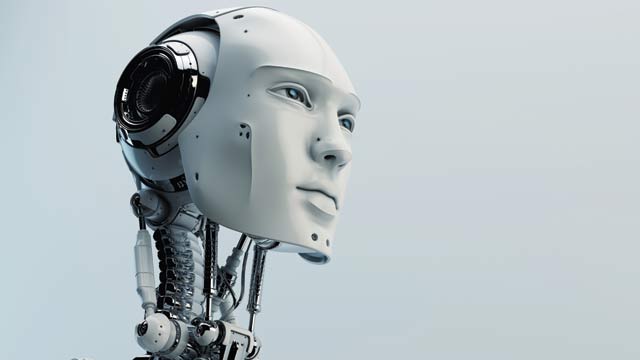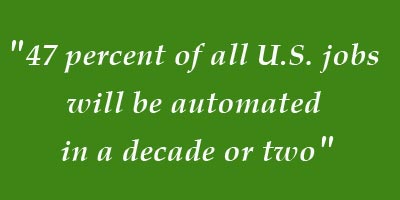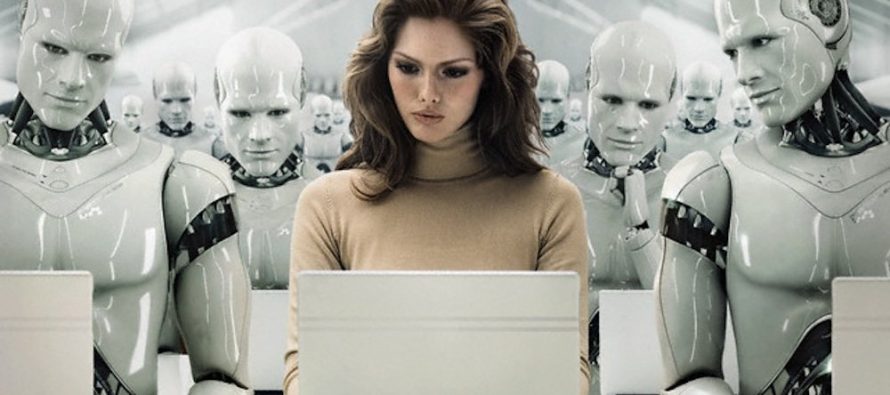 The rise of the robots may indeed be in our future as they take more and more of our jobs, but what is the impact? And when will this happen? We have been told the last few months that immigrants are taking our jobs. I’m not sure what details the current administration is looking at because it’s pretty evident, that it won’t be immigrants, it will be Artificial Intelligence (AI). Yes robots taking our jobs.
The rise of the robots may indeed be in our future as they take more and more of our jobs, but what is the impact? And when will this happen? We have been told the last few months that immigrants are taking our jobs. I’m not sure what details the current administration is looking at because it’s pretty evident, that it won’t be immigrants, it will be Artificial Intelligence (AI). Yes robots taking our jobs.

The odds are high, according to recent economic analyses that 47 percent of all U.S. jobs will be automated “in a decade or two,” as the tech-employment scholars Carl Frey and Michael Osborne have predicted. That’s because artificial intelligence and robotics are becoming so good that nearly any routine task could soon be automated. Robots and AI are already transporting products around Amazon’s huge shipping centers, and diagnosing lung cancer more accurately than humans.
According to Business Insider, Amazon already has 45,000 robots working in their warehouses. How could government overlook this reality? It’s not a sci-fi movie. It’s happening now! And as you’ve probably seen Google’s driverless cars in the news. We are not just building robots, we are building “thinking machines.” Machines that can make cognitive decisions. Essentially, cognitive computing “refers to computing that is focused on reasoning and understanding at a higher level, often in a manner that is analogous to human cognition — or at least inspired by human cognition,” says Lynne Parker, director of the division of Information and Intelligent Systems for the National Science Foundation. With all that said, Amazon announced that they will add 30,000 part time jobs in the year 2017. Mostly warehouse and customer service. I think the point there is that there is a shift in future services needed – future jobs.
“Amazon announced that they will add 30,000 part time jobs in the year 2017.”
Facts and predictions
- Pew Research Center reports that immigrants make up 13 percent of the population and 17 percent of the workforce, but their employment patterns contrast with those of their U.S.-born counterparts across industries and states.
- Price Waterhouse Cooper reported that 38 percent of jobs in the U.S. are at high risk of being replaced by robots and artificial intelligence over the next 15 years.
- “By 2021 a disruptive tidal wave will begin. Solutions powered by AI/cognitive technology will displace jobs, with the biggest impact felt in transportation, logistics, customer service and consumer services,” said Forrester’s Brian Hopkins in the report.

Intelligent robots
These robots, or intelligent agents, represent a set of AI-powered systems that can understand human behavior and make decisions on our behalf. Current technologies in this field include virtual assistants like Alexa, Cortana, Siri and Google Now as well as chatbots and automated robotic systems. For now, perform simple tasks, but over the next five years they will become much better at making decisions on our behalf in more complex scenarios, which will enable mass adoption of breakthroughs like self-driving cars and personal assistants.
As we become comfortable with advanced technology, so it will replace us. But we are an adaptable species and will figure it out. However, it would be helpful if our government provides us the tools and education to stay ahead and not back in the coal mining days.